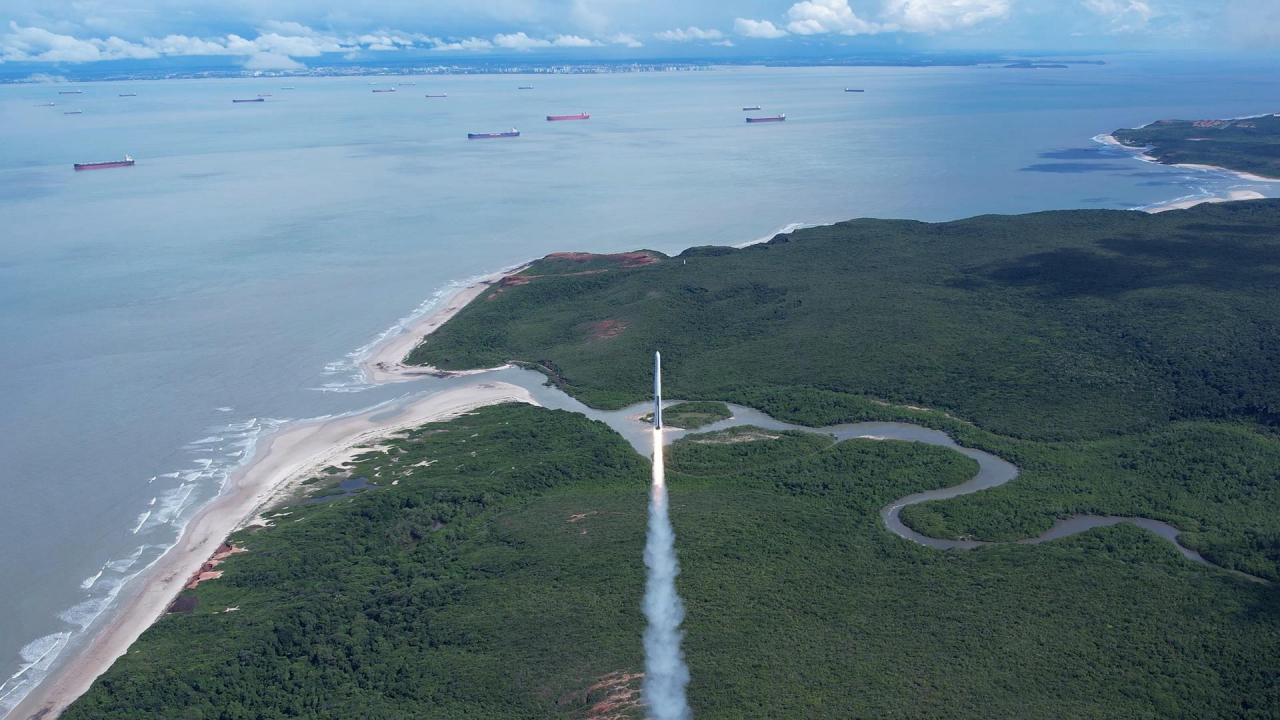 |
Innospace's hybrid rocket Hanbit-TLV takes off at the Alcantara Space Center in Brazil on March 16. (Yonhap) |
Fashion and materials conglomerate Kolon Group is eyeing the aerospace business as its driver of future growth, following its belief that the group’s know-how in producing various composite materials will prove competitive in the space sector.
Kolon set in motion its vision to foray into the space business in 2019, starting with its venture capital unit Kolon Investment’s 1 billion won ($757,679) investment in Innospace, a South Korean startup specializing in developing hybrid space rockets.
While Kolon Investment continued upping its stakes in the space startup as a financial investor, Kolon Glotech, a sister firm that develops fabrics for car seats, invested 60 billion won as a strategic investor.
The two Kolon companies have invested a combined 10.8 billion won in Innospace so far, becoming the largest outside investor with a 17.7 percent stake.
Backed by Kolon’s funding, Innospace became the first private company to launch the world’s first hybrid rocket with an electric pump in March this year.
The Hanbit-TLV rocket uses several parts made of Kolon Dacc Composite, the group’s composite materials unit.
The parts range from pressurized tanks that store high-pressure helium and nitrogen gases, to composite nozzle assemblies that helped in generating the rocket's thrust by converting ultra-high-temperature high-pressure combustion gases into kinetic energy.
“Our goal is to apply our advanced composite material production technology that has been used in the arms industry to space mobility,” a Kolon official told The Korea Herald. “Because there is little difference in the development process, we are confident we can successfully expand our business to the space arena.”
Largely buoyed by Innospace's successful rocket launch, Kolon plans to expand its presence in the space sector as it considers investing in diverse areas such as satellites, controlling and communications systems.
According to market tracker Research and Market, the satellite launch vehicle market alone is expected to be worth $29.6 billion by 2027 globally with an annual growth of 15.1 percent.
Kolon Glotech recently participated in the Series A funding round for Nara Space, another Seoul-based startup specializing in developing micro satellites, for an undisclosed amount.
"We are interested in working in businesses related to space with an aim of creating mid- to long-term results rather than short-term," said Kim Yong-in, a team leader at Kolon Glotech, during a space forum held in November last year.
Kim added that Kolon is expecting to greatly widen the scope of its space business, working together with its materials and fashion businesses as well, envisioning that it could upgrade space suits by using the group’s fashion technology such as its own polyimide that is self-adhesive when ripped or damaged.
"We even expect that someday it will be possible to create synergy by, in turn, applying high-tech technologies used in space to Kolon Glotech's material industry," he added, saying that Kolon Glotech is putting in full effort in foraying into the "space value chain" in the near future.






![[Today’s K-pop] Blackpink’s Jennie, Lisa invited to Coachella as solo acts](http://res.heraldm.com/phpwas/restmb_idxmake.php?idx=644&simg=/content/image/2024/11/21/20241121050099_0.jpg)
